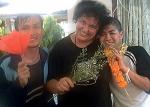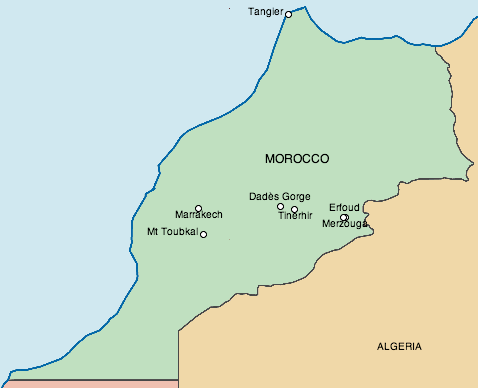9/11 & Two Muslims
Saturday, March 23rd, 2002The next day, we spent the day in Marrakech waiting for our favorite night train back to Tangiers. I spent all afternoon at the Ali Hotel Internet Cafe while Bob went out walking through the city again. Ate dinner at a restaurant overlooking the Square. Bob had great beef stew with onions and raisons. I had a welcome spaghetti with pomodora (tomato) sauce and water. On the way back to the hotel we bought a liter of fresh squeezed orange juice for about 75 cents for the trip back on the train.
By this time I had made friends with a young man who was in charge of the Internet Cafe-Fattah Boutnach. We had been trading cultural information intermittently before we left on the excursion and since I felt there was generally a pretty good feeling between us I decided to ask the big question. The first thing he had said to me when we met was that “Americans and Europeans are very HARD.” This took me by surprise, but we do have a competitiveness that makes us hurried and sharp with each other. In the interest of being task-oriented have we gained everything at the risk of losing our souls? The rest of the world fears this is true and doesn’t want it to happen to them.
He said that my name, Eunice, is the name of a prophet in the Koran-the
‘man that was eaten by the fish” (Jonah) and that Eunice is a name for a man in the Arabic world.
But back to my big question. From Fattah’s perspective I wanted to know “what was the pain that caused 9/11?” Curiously, Fattah didn’t understand my question. The answer was political not emotional.
Fattah’s English was not that sophisticated so he invited a friend to join our conversation-a handome man in his 30’s with clear eyes and resolute but warm and friendly manner. He was clean shaven and had on a beautifully immaculate white cotton jamalla. As it turned out he was very well read in English. When asked, he said that his job was educating very young children but he quickly added that more importantly he was a student of history and philosophy. (Educating the next generation of jihadists, I wondered.) In response to the realities in the Arab speaking world he had written an article for a French publication. He promised to use a translation program on the internet to translate the article into English for me and send it to me via email which I never received.
But following are some of the comments they made during our conversation:
1. “Maybe now Americans, in particular your American government, will try to understand “the other” a people different than yourselves. Your government-and we understand that it is not done by the American people-has chipped away at our identities for years now-has denied us who we are and it is time for this to stop and the American people must understand what’s happening and put pressure on their government to get it to stop doing this.
2. They wanted to talk about the “aggression” in Afghanistan and said that they did not believe Osama bin laden was connected to 9/11 but I tried to steer the conversation away from those topics because I wanted to stay on a more personal level. They wanted to know how we knew for sure that Osama was actually saying what we thought he was saying on the videotape. I explained that the government had four different translators translate the video and that in addition, because they doubted any translation commissioned by the US government, an Arab advocacy organization also translated it. I told him we heard Osama exclaiming how it was a good thing that it happened. Then they dropped the subject but I don’t think they were convinced.
I countered to the first comment that before 9/11 Bush barely was elected president-that our intellectuals were trying to understand but the average American did not have a clue why 9/11 happened and was supporting Bush’s policy on terrorism.
The men wanted to know why and I said that because most Americans do not read and study about what our government does in other countries so they don’t know how our government is perceived by people in other countries. I continued that most American people get their information from the press but that that information was generally considered by our intellectuals to be very shallow. Also most Americans basically were not interested in international news because they are busy working to earn a living and do not see that it is relevant to their lives. So the press does not give us much international news in the first place.
The two men countered that Americans must begin reading because people in other countries are reading and are developing opinions of our government based on what they read. They gave an example-comments that our vice president, Dick Cheney made a few years ago, that is widely read in the Arab world and has them (Arabs) “scared to death.” Then Fattah’s friend gave me a list of books he thinks Americans must also read: Thomas Freeman “The Mind Managers” published by Beacon Press in Boston in 1974 and “Globalisation, The Human Consequences” by Zygment Bowman published by Cambridge Press in 1998.
By this time I had to leave for the train so we traded email addresses and we all affirmed that there is always hope for people to learn to get along with each other. I told them about John Hofer’s imperative that I report back to my friends at home what my travels revealed about what we have become in this world. Fattah told me that this was a very great responsibility. Then they said “lahamdalela” to me as I left-meaning, they said, “Thanks to God.” The conversation left me reeling.


